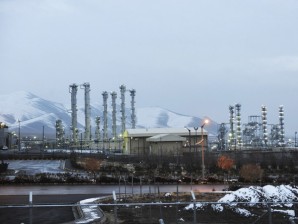US Senate approves sanctions against Iran
WASHINGTON – The US Senate on Monday approved new sanctions against Iran aimed at convincing the Islamic Republic to suspend its uranium enrichment, which western powers say is a cover for developing nuclear weapons.

FILE - A Saturday, Jan. 15, 2011 file photo, shows Iran's heavy water nuclear facilities near the central city of Arak 150 miles (250 kilometers) southwest of Tehran. The negotiating stance from Iranian officials never varies: The Islamic Republic will not give up its capabilities to make nuclear fuel. But embedded in the messages are meanings that reach beyond Tehran's talks with world powers. AP PHOTO/ISNA,HAMID FOROUTAN, FILE
The measure was approved unanimously ahead of talks Wednesday in Baghdad between Iran and representatives of the world’s main powers.
The bill allows President Barack Obama to impose sanctions on any country or company that enters joint ventures with Iran to develop its oil or uranium resource, or provides technology or resources to help Iran with such development.
It also includes measures against anyone who provides goods that “materially contribute to Iran’s proliferation of weapons of mass destruction (WMD) program or its terrorism-related activities.”
Iran insists its nuclear program is purely for civilian purposes.
“Both the White House and Congress are committed to preventing Iran from obtaining nuclear weapons capability,” said Democratic Senator Robert Menendez, the bill’s chief architect.
Article continues after this advertisementIran can either “come to Baghdad with a real plan” to end its nuclear program “or we’ll make our own plan — through sanctions or other necessary measures — to ensure that Iran fails to achieve its nuclear ambitions.”
Article continues after this advertisement“The Senate has worked hard to improve our sanctions toward Iran,” added Senate Republican Leader Mitch McConnell, “and this effort, combined with the sanctions of the European Union, should strengthen the hand of our own negotiators.”
The bill must now be reconciled with sanctions approved by the US House of Representatives on December 14.
The legislation targets Iran’s national oil and tanker firms, its elite Islamic Revolutionary Guards Corps (IRGC), and would for the first time widen sanctions on Iran’s energy sector to any joint venture anywhere in the world where Iran’s government is a substantial partner or investor.
The bill calls for a US travel ban and freezing of US assets aimed at individuals and firms that provide Tehran with technology — everything from rubber bullets to surveillance equipment — used to repress dissent.
It would require firms competing for US government contracts to certify that they and their subsidiaries have not had “significant economic transactions” with the Revolutionary Guards or individuals or entities connected to it.
The bill also includes language introduced by Senator Rand Paul stating that the measure does not authorize the use of military force.